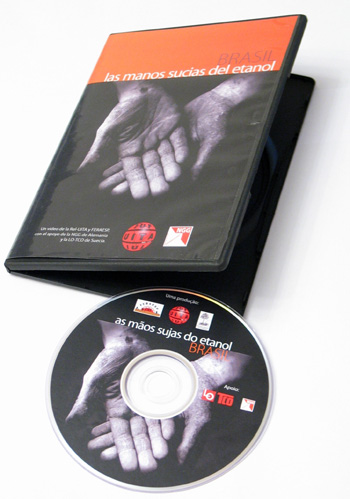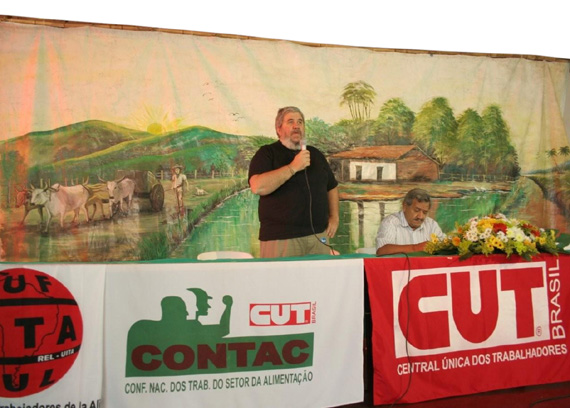“Hands drenched in ethanol. Clean
fuel?”, a series of four short films on
Brazil’s ethanol industry, were
officially presented to the public on
Saturday, Sept. 11, at the Sixth
Ordinary Congress of the Federation of
Rural Laborers of the State of São Paulo
(FERAESP), held in the city of
Araraquara, some 250 kilometers from São
Paulo.

The four ten-minute videos, directed by
filmmaker Silvia Martínez, were screened
before the nearly 100 delegates from the
70 trade unions affiliated to FERAESP.
The first video, “Disposable
workers. The flesh and bone of ethanol,”
shows how over the past two years
ethanol mills have forced cane cutters
to step up their work pace in order to
double their productivity, with the
physical and psychological consequences
such effort entails, coupled with the
total absence of State control, which
leaves workers without any health care
or social security benefits.
“Migrant
workers. Slaves to ethanol”
portrays the system of exploitation that
cane cutters are subjected to and which
is rife with abuses as they start out on
their long and perilous journey from
various impoverished regions of
Brazil to the cane fields, where
they are faced with the harsh reality
that the paradise they were promised is
actually a living hell of overcrowded
living barracks, low pay and harsh work
under the scorching sun.
“A
day in the cane fields. The human
machinery of ethanol”
features shocking images filmed right on
the fields, revealing the cane cutters’
inhumane working conditions, which
combine constant exposure to the sun,
high temperatures, an intense work pace,
repetitive strains and heavy work, no
protective gear, unsanitary eating
conditions, and long workdays that begin
at 4 in the morning and stretch for 10,
12 or 14 hours.
The last video, “Elio
Neves. A labor struggle,”
recounts the struggles of cane cutters
in the state of São Paulo, as narrated
by FERAESP president Elio Neves,
who describes the extreme police
repression they suffered in their
attempts to fight for their rights, the
beginnings of the federation, its
battles and victories, its ups and
downs, the lessons learned, the goals
and projects, and most importantly the
struggle for an integral agrarian
reform.
Congress participants watched the video
with great interest, applauding
enthusiastically at the end. Speaking
after the screening, Elio Neves
and CONTAC president Siderlei
de Oliveira, also present at the
Congress, had warm words of praise for
the films and observed that they
provided accurate and thorough
information on the issues addressed and
on the lives of these workers who are
excluded from the superficial
assessments that proclaim the virtues of
ethanol as a clean fuel. Far from this
image of cleanliness, the videos clearly
show how ethanol has soiled the hands of
the industry, they said.
These films produced by the IUF’s
Latin American Regional Secretariat,
Rel-UITA - available in Spanish,
German and English - will be shown
throughout the world under a campaign of
denunciation of the working conditions
endured by cane cutters in Brazil.
The films were made possible thanks to
the support of FERAESP (Brazil),
NGG (Germany) and LO-TCO
(Sweden).
